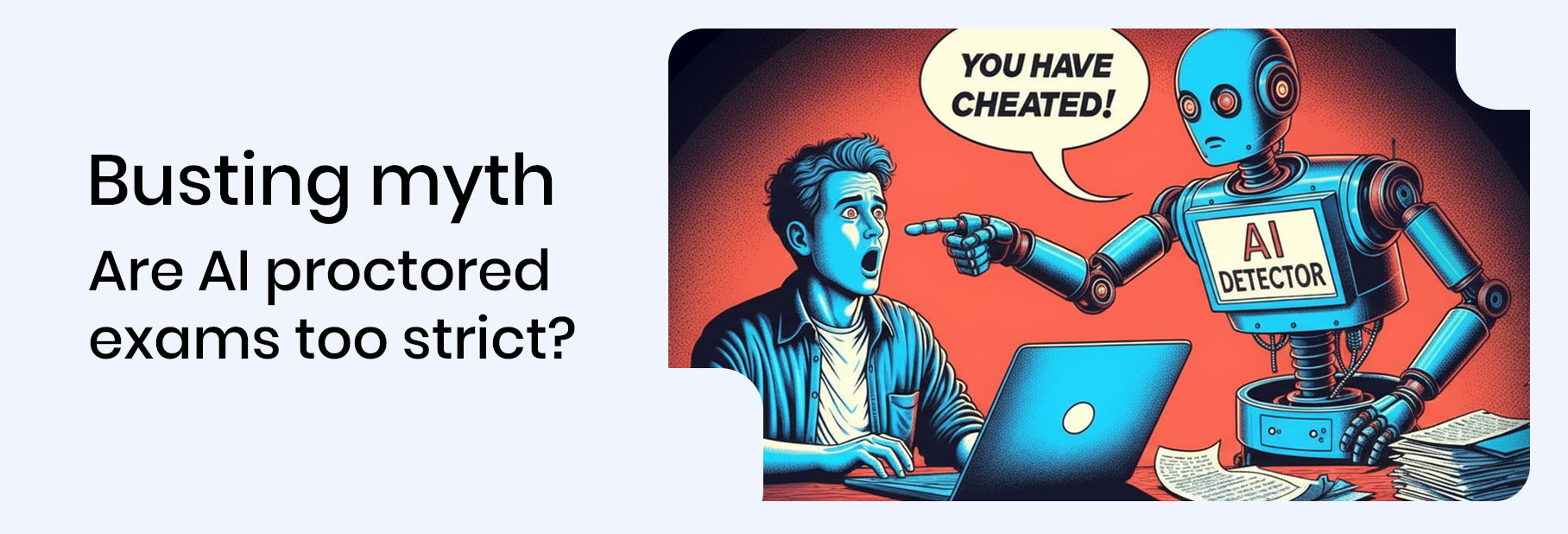
Busting myth - Are AI proctored exams too strict?
It's a common fear among students that AI proctored exams are too strict, but this idea is often based on a misunderstanding of how the technology works. Take DigiProctor, for example. While it is designed to be highly vigilant to ensure fair testing, it uses smart safeguards to make sure it only flags real problems, not every little thing you do. This helps create a secure and fair experience for everyone.
Here's a breakdown of some common myths about AI proctoring, with a focus on how DigiProctor addresses them:
Myth: AI systems will flag me for every little thing.
Reality:
It's a common fear that an AI system will flag you for simple, natural actions like scratching your head or looking away for a moment. However, DigiProctor is designed to look for “patterns of behaviour”, not isolated incidents.
The system analyzes a combination of factors, such as eye movement, head position, and background noise, to find actual signs of cheating. For example, consistently looking down or away from your screen for a long time might be flagged as it could suggest you're using notes or another device. A simple, quick glance away or a moment of fidgeting won't trigger an alert. DigiProctor focuses on what truly matters: ensuring a fair and secure exam without getting in the way of your natural testing behavior.
Myth: AI is biased and flags students unfairly.
Reality:
A common fear is that AI systems will unfairly flag students due to things like poor lighting or background noise. While it's true that these factors can sometimes lead to a "false positive" flag, DigiProctor tackles this head-on with a hybrid proctoring model. This means that when the AI flags something suspicious, a human proctor reviews the incident to make sure the student isn't being unfairly accused. This combination of AI and human oversight helps ensure a fair and accurate decision every time.
Myth: AI proctoring is a complete invasion of my privacy.
Reality:
It’s a valid concern that being monitored during an exam feels like a privacy invasion. However, a reputable platform like DigiProctor is built with privacy as a top priority. For instance, DigiProctor is ISO 27701 certified, which means it meets the highest international standards for managing and protecting personal information. The monitoring (webcam, microphone) is only active during the exam and stops as soon as you finish. The data collected is used only to ensure exam integrity and is stored securely, with transparent guidelines on what is being monitored.
Myth: It's easy to cheat AI proctored exams.
Reality:
AI proctoring systems use a multi-layered approach to prevent cheating. They employ different technologies to prevent cheating or impersonation.
let's look at how these technologies are deployed by secure systems like DigiProctor, which uses several layers of security to ensure a fair testing environment for everyone. While no system is completely foolproof, advanced technologies makes it significantly harder to cheat on a DigiProctor exam compared to an un-proctored one, creating a more secure and trustworthy testing experience for all.
Here's a breakdown of DigiProctor's key features:
Secure Browser
DigiProctor locks down the test-taker's browser to prevent them from opening new tabs, visiting other websites, or using outside applications. This ensures that all focus remains on the exam itself. Digiproctor also uses next-gen browser technology which, if the exam so requires, permits students to visit only the permitted website in the Internet and to no other site.
Identity Verification
Before permitting students to enter the exam, Digiproctor uses facial recognition to confirm the test-taker's identity. In addition to AI-based identity verification, Digiproctor also provides for humans to approve a student before allowing him/her to enter the exam. Also, once the students start their exam, their identities are continually monitored throughout the duration of exam to prevent someone else appearing for the exam on behalf of the student after the initial identity verification is done.
Behavioral Monitoring
DigiProctor analyzes a student's behavior during the test, such as their speed of answering the questions. These insights help flag any unusual patterns that might indicate cheating. Digiproctor can also detect unauthorized people or voices in the background, which helps to prevent someone else from taking the exam or helping the student.
Room Scan
Before the exam begins, Digiproctor requires students to do a quick 360-degree scan of their room. This helps confirm that there are no unauthorized books, notes, or other materials in the testing area. The 360-degree scan is also triggered randomly during the exam.
In addition to the 360-degree scan, Digiproctor also allows the student’s mobile camera, in addition to the laptop’s webcam, to be used for monitoring the student’s behaviour by streaming video to the proctors.
Deep Proctoring
In addition to monitoring the video and audio feeds of students taking the exam, Digiproctor also does a scan of the students’ machines every 30 seconds to identify if the student is using a screen sharing software, virtual cameras, virtual machines or connecting to external devices. This ensures that use of technology-supported cheating is thwarted at the very root.
Conclusion
AI proctored exams are a technology-driven solution to the challenge of maintaining academic integrity in a world of online learning. While some of the concerns about their strictness and potential for false positives are valid, many of the "myths" are addressed by the design and implementation of modern systems like Digiproctor. By using a hybrid approach that combines AI with human review and by prioritizing data privacy, proctoring platforms strive to strike a balance between security and fairness, ensuring a secure and reliable experience for both students and educational institutions.